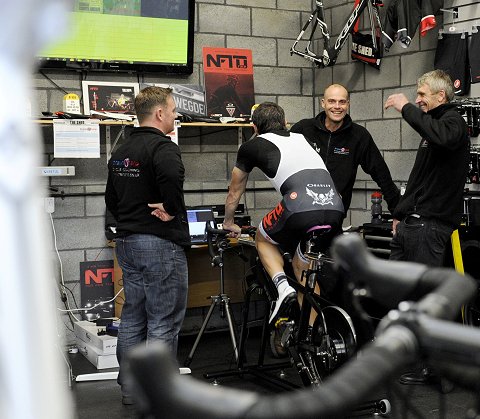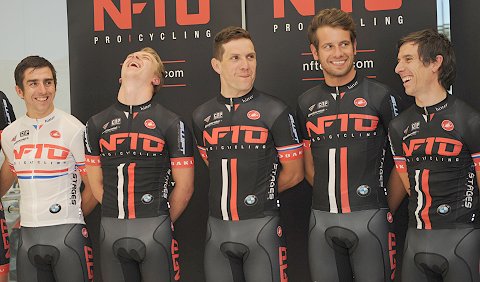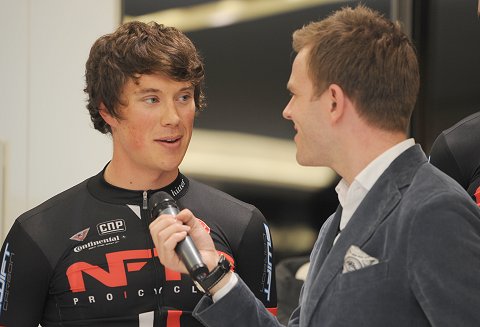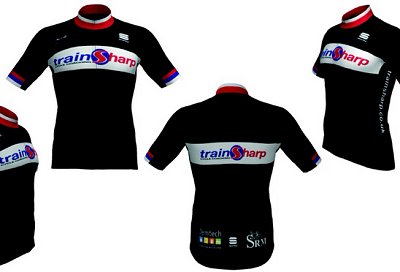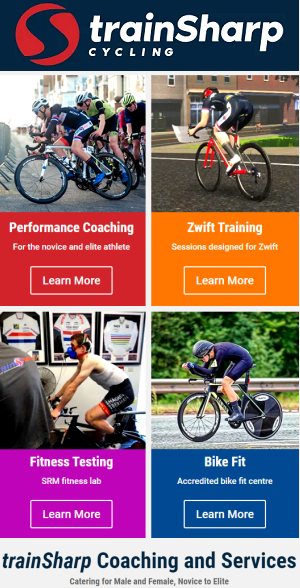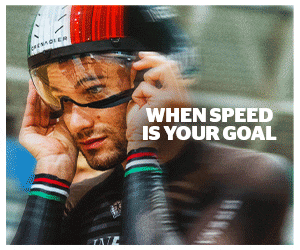As more and more teams are seeing the value of a team coach, for 2014, NFTO Pro Cycling has Trainsharp helping their riders be the best they can be
 |
NFTO’s Team Coach – Trainsharp
Coaching company Trainsharp, based in the South East of England, is growing fast and their group of coaches are helping riders at all levels fulfil their potential on a bike. Founder Jon Sharples is a former road sprinter who knows what it’s like to enjoy the highs of winning as well as the lows of suffering on a bike.
Jon helping Dean Downing put himself in the hurt locker during ramp tests
Alongside Jon is Sean Yates with an even higher profile as a cyclist. He’s worn the yellow jersey in the Tour de France and been a DS since the late 90’s culminating in helping guide Sky team and Bradley Wiggins to the first ever British win in the Tour de France.
Backing them up are even more coaches with specific skills all brought into the company to help them provide the best possible service whether its NFTO and their riders or all the other clients that Trainsharp now have.
That includes other teams as Jon explained to VeloUK. “Teams are now coming to Trainsharp and have us structure their team to make sure the riders are arriving at races with the freshest legs possible.â€
“Cycling is booming today and loads of riders have a coach and power meter but a lot of the teams on small budgets have some really good riders who don’t have the money to afford a coach so the team is asking can we help. That’s why we’re working with teams like Catford CC and Haribo Beacon for example, as well as NFTO.â€
Whilst both Catford CC and Haribo Beacon are going to be racing the top level events in Britain, it’s Trainsharp’s link with UCI registered NFTO that is particularly making the headlines.
The NFTO team launch and Matt Barbet interviews Jon along with another of Trainsharp’s coaches, Sean Yates (right)
“It’s an exciting chance to prove myself,†says Jon. “I don’t race now so my passion is to make other people faster and it’s such a good feeling when they are going faster and showing that what we do works and that there is no guess work in what we doâ€.
Talking to the riders at the recent team launch of NFTO Pro Cycling, it was clear they’ve had a good winter. Dean Downing explains in his interview (to come on VeloUK) that he’s ‘pinging’ right now. It’s all a long way from those first ramp tests back at the NFTO headquarters in Hereford.
The Shed’s Hurt Locker
Three or so months ago, the riders from NFTO Pro Cycling assembled to put on some lyrca and ride as hard as they could on a stationary bike while three Trainsharp coaches gathered the data as the starting point for their work with the riders in NFTO.
It was says Jon, an opportunity to meet and greet the riders and try and find out more about them. To see what the rider feels their strengths and weaknesses are. “It’s a big deal that a rider understands the ethos behind our training,†says Jon. “Not a lot of people realise the weakness is an area they need to train because many prefer working their strengths, which will take care of themselves really.â€
Jon added it may be that what a rider feels is a weakness may also be more a confidence issue than a physiological one and that the ramp test numbers may well back that up.
Job Roles
The ramp test and the numbers it produces also go a long way to helping the coaches and managers learn a lot about a rider, including what an individual’s job role may be in the team.
“What we are looking to do is define job roles for each rider so they can work as a team and believe in it and understand what they are doing. I always feel if you can explain to a rider why they need to do specific training they will do it with a smile because a lot of guys are told to do something but don’t understand why they are doing it and think there’s no point in it.â€
“So, the numbers help them understand why they are working for a specific rider on a specific type of course.†says Jon. “One day they may be working for a rider who can climb and it will be their job to help get that rider to a finish climb as fresh as possible. Then, another day, it’s payback for the bigger more powerful riders on a flat course that may suit a sprinter.â€
The ramp test – a starting point
Asked what else the coaches get from the ramp tests, Jon explains: “Having the benchmarks lets us tell them where the fitness lies at this point in time so any training we create for them in the zones will be realistic. It won’t be too hard or too easy. It will also be individual to them.â€
“What we get from the test is how much power is being produced by a rider. We can’t measure endurance for example but that’s something we can get from having the power meters on the bike. So the ramp test tells us their numbers and then, on the bike, the power meters tell us how long they can hold those numbers for.â€
That was at the back end of last year and since then, a lot of miles have passed under the wheels of the riders in NFTO Pro Cycling. At the launch, riders like Dean Downing explained how they already have good form with the major goals still over a month off and as yet, no races.
One of the team’s big signings, Russell Downing on the test rig in The Shed.
Jon says his motto is train hard, race easy and then outlines why there’s hard training which is good and hard training which isn’t as good.
“Our approach is to build a base that is quite hard and makes them feel like they have plenty of endurance. The trouble with using power meters and doing intervals is that it can make the rider want to train hard all the time which is why they tend to train easy in the winter and then do intervals closer to race time.â€
“Intervals though are like icing on the cake, they can bring form quickly but it’s not sustainable so doesn’t normally last long. Our aim is to build a strong base early on before the races, one that doesn’t fatigue the body too much.â€
Listening to riders talk about their time in Australia, one ‘drill’ was especially hard it seems; EPD (explosive efforts).
“There are variations of these,†says Jon, “ that simulate the effort riders make to get away from a bunch to try and catch a breakaway. You start by going really hard so you don’t drag everyone across slowly and then go into time trial mode. It’s an effort that floods the body with lactate and a very good way to get into shapeâ€.
But training isn’t all about riding a bike hard as Jon explains: “One of the biggest things that we seem to see missing from a rider’s training is zone 1 riding. They all shy away from it as it easy and they get cold. They don’t know why they need to do it.â€
“Cycling though is an endurance sport and you need to be fit. Power is one thing but being endurance fit is another so by using the zone 1 efforts, riders can help build into the muscles the ability to carry more oxygen and develop more power later.â€
“The pros in their day would do seven hour rides back to back on the small ring in small groups for a few weeks or few months and that is essentially what we are doing. Not every day, but making sure they are still doing that work and it’s something new to a lot of riders, the art of easy riding. Most just like to ride hard and then have a rest day but they miss out some easy riding.â€
The team in a good place mentally at the team launch with plenty of form in the legs and banter between teammates.
Having control
All this training is done with power meters on the bikes, the Stages power metre, and this gives the rider and coach control over the training rides. “Training with power is personal to each rider,†says Jon.
“They each have their own set of numbers and so they know what a good session is and what a bad session is and start to feel patterns within their body. If they find they are not hitting the numbers, it’s a sign they are a little fatigued and it might be time to take a bit of a rest. Or, if you are feeling good and hitting new numbers (highs) then that gives them confidence going into their event because they are a better bike rider than they wereâ€.
Training to race or racing to prepare for bigger races?
A pro cycling team is put together to race but the message every time from NFTO is that their first race will be the Tour of the Reservoir. Reading between the lines, what they mean, I think, is that it’s the first race that NFTO will hit as a team and the colours will be seen in other races before then. Which races wasn’t confirmed at the launch but the Jock Wadley is one where they are expected to have some riders.
It begged the question, do riders need to race to be fit for a goal? I put that to Jon who replied: “Most of these guys know what they are doing, having done it for a long time, so they will never forget how to race.â€
“If they are fitter, they will be fresher and then do what they do a lot better. The confidence will be high as well. As I said, my motto is ‘train hard, race easy’ and I feel they will be confident in their races.â€
“We’re preparing them to race. To do that we follow meto cycles so each month we work on an area or theme and then move on. And this is why they feel so good now. Some of the training sessions are replicating race modes which means that at the moment, training is fun and interesting for them.â€
One of the riders who may well be having a hit out in the Jock Wadley in a few weeks is Hugh Wilson, last years winner for NFTO.
Training camps
Looking at the riders at the launch, it was easy to spot they had been training in Australia by their tans. That was only a few weeks ago and now they are in Majorca on another camp and the training for each camp is well thought out as Jon explains.
“Back at the Trainsharp base, we have six coaches and so there is an awful of knowledge there. We sit round the table and talk it through and come out of it all singing from the same hymn sheet. We’re happy with what we think they should do.â€
“At the camp in Australia, for example, the training was definitely tailored for them to acclimatise to the heat and to back off so they don’t come home too tired and can hit the ground runningâ€.
“I think that is where a lot of riders can go wrong. As its sunny outside and warm, they over indulge and do too much training and it can take maybe four weeks for it to come through if they’re not careful . It has to be structured.â€
The camp in Majorca will be different to the one in Australia Jon says and not just because of the climate. “They have been to Majorca many, many times so they know what roads to use. The training is about them as a team and each individual will have a job role and we’ll have them doing drills like lead-out’s and climbing. It’s more about race preparation now.â€
Which means it will be a few weeks before the riders start pinning numbers on and getting the feel for racing as a unit in a race, as against training efforts where its only them on the same piece of road. Watching closely, whatever the results, will be the coaches at Trainsharp who will be kept busy as the season begins and they learn more and more about their riders.
Finally, know the name, wear the jersey
The Trainsharp brand has been round for a few years now, not just on VeloUK but elsewhere and with that growing following has come a desire from fans to wear that brand on a jersey. And so, Trainsharp now have their own jerseys and shorts.
“We introduced some clothing because people want to ride with our name on their back,†says Jon. “ Now they can buy the kit for what it costs us. They are good quality tops and shorts which means it’s decent kit to wear and it’s good visibility for the brand as well.â€
To learn more about the kit, click here to visit the Trainsharp website which has a lot to offer as well as the kit. Whether its coaching or ‘freespeed’ hardware for the bike, Trainsharp are all about making you go faster…
Other Results on VeloUK (including reports containing results)
- RR Result: East Cleveland Classic
- Features, Reports, Results
- Crit Result: Tameside Cycling Development Circuit Races 1
- Crit Result: 2024 West Thames League 1
- Startlist: The Drummond Trophy
- TT Result: VTTA Surrey/Sussex 10 mile TT
- TTT Result: Scorton TTT
- TT Result: Manchester & District TTA 25m TT
- TT Result: Stowmarket & District CC 15m TT
- TT Result: Paceline RT Sporting TT
- TT Result: Hereford & District Wheelers 25m TT
- RR Result: Yorkshire RRL #1
- Crit Result: Scottish Student Cycling Criterium Championships
- Events: Dave Peck Memorial
- EVENTS: Proper Northern Road Races – Round 2 Oakenclough
- TT Result: Blaydon CC Two Up TT
- TT Result: Kent CA 10m TT
- TT Result: Wessex RC 24m TT
- TT Result: Easterley RC 25m TT
- TT Result: Cranbrook CC 10m TT
- TT Result: Penzance Wheelers 12.5m TT
- TT Result: Fife Century RC 25m TT
- TT Result: Bramley Wheelers 10m TT
- TT Result: Mid Shropshire Wheelers 25m TT
- Youth Result: Hog Hill GP (National Youth Series)
- RR Result: Velo Club Venta Spring Road Race
- News: Women’s Tour of Britain
- Crit Result: Ennerdale Season Openers 2
- RR Result: NCRA Handicap RR (week 5)
- RR Result: Surrey League 2/3 (April 14)
- Report/Result: TLI Cycling Dave Astles Memorial Races
- RR Result: Cadence Junior Road Race
- Crit Result: Matlock CC Darley Moor Circuit Race #1
- Startlist: PB Performance Espoirs Road Race
- Crit Result: RBL Race Series 1 (MK Bowl)
- Crit Result: Ride Flux Spring Crit series #1
- Crit Result: Portsmouth Evening Circuits
- Crit Result: Full Gas Summer Series 1
- East Cleveland Classic: Saint Piran Team
- News: New kit for Ribble Rebellion Riders
- Crit Result: Thruxton Midweek Circuit Races
Other News on VeloUK
- Startlist: The Drummond Trophy
- Events: Dave Peck Memorial
- EVENTS: Proper Northern Road Races – Round 2 Oakenclough
- News: Women’s Tour of Britain
- Startlist: PB Performance Espoirs Road Race
- East Cleveland Classic: Saint Piran Team
- News: New kit for Ribble Rebellion Riders
- Events: Halesowen Friday Track Nights
- Team News: Ribble Rebellion off to the USA
- News: Pedal Club Lunch (March)
- Rider News: Winning start for Billy Ladle
- News: CiCLE Classic 2024
- Startlist: Stars of the SW Men’s U23 RR
- Startlist: Danum Trophy 2024 (Nat B)
- Startlists: London Dynamo Road Races
- Startlist: La Fleche Waltonne Road Races (BMCR)
- Meet Ribble HoloRider
- Startlists: East Cleveland Classic 2024
- Former Winners: Lincoln Grand Prix
- Chris Lawless Joins Saint Piran Team
- Paracycling Track Worlds Day 4
- Para CyclingWorlds Final Day
- Startlist: National Youth Circuit Series Rd 1
- Report/Result: Azets Spring Classic
- Startlists: RCR Fat Creations Road Races
- Startlist: Capernwray Road Race (March 31)
- Team Report: Fensham Howes MAS Design Junior Team
- Team Report: CiCLE Classic Junior Men
- RIDER REPORTS – Zoe Parker (Solihull CC)
- GB News: Two World Titles for GB at Para Worlds
- Team News: Alba Development Road Team
- News: British Road Champs Return to NE
- THIS WEEKEND: Peaks Two Day is Back!
- News: Laura Kenny Retires
- Team News: Lee Valley Youth Cycling Team
- 2024/25 CYCLO-CROSS CALENDAR
- Startlist: Cardiff Ajax CC 10 Mile TT
- Startlists: 16th Gifford Road Races (Scotland)
- News: Ellingworth is new Tour of Britain Director
- Startlist: Circuit of Ingleborough TT








